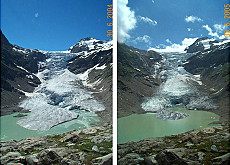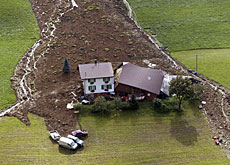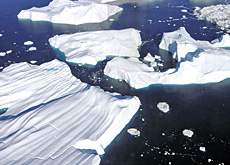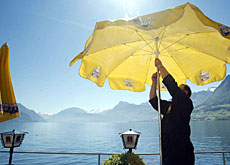Experts approve bleak climate change report

An international global warming conference has approved a report on the impacts of climate change after a contentious marathon session.
The environmental organisation WWF Switzerland warned that the Alps could be hit by heatwaves and droughts, and called for a dramatic reduction in greenhouse gas emissions to avoid the worst consequences.
On Friday more than 100 nations belonging to the Intergovernmental Panel on Climate Change (IPCC) agreed a final text in Brussels after all-night disputes.
The report, the second of three being published by the IPCC, lists numerous consequences on people, the climate and ecosystems. It will guide policy in coming years on issues such as extending the UN’s Kyoto Protocol beyond 2012.
A warming world will place hundreds of millions of extra people at greater risk of food and water shortages and threaten the survival of thousands of species of plants and animals, the scientists said.
Floods, heat waves, famines, storms and droughts are all expected to increase, with people in poorer countries suffering the worst effects.
Clear-cut consequences
According to the WWF, the report contains for the first time specific details on the impact of climate change in Switzerland. For example, flora and fauna more sensitive to the changes in temperature are expected move into higher areas and others, which are less mobile, will reduce in numbers or die out.
The report predicts that up to 30 per cent of species face an increased risk of extinction if global temperatures rise two degrees Celsius above the average in the 1980s and ’90s.
Small glaciers in Switzerland could disappear altogether while larger, more important ones would shrink between 30 and 70 per cent by 2050. This could result in the formation of large lakes and greater risks of flooding.
“The most dramatic effects can only be avoided if industrialised countries like Switzerland reduce their greenhouse emissions by 30 per cent compared with 1990 levels by 2020,” said Patrick Hofstetter, from WWF Switzerland.
But other measures should be taken to reduce damage from climate change in the Alps, such as preventive measures to deal with rockfalls and mudslides, it added.
Swiss involvement
Swiss expert Andreas Fischlin, one of the lead authors of the report, said that politicians should pay close attention to the new document.
“It translates what the findings [of the first IPCC report] really mean for humans, settlements, industry, agriculture, forestry, and natural systems such as glaciers or ecosystems,” Fischlin told swissinfo.
The IPCC’s first report, published in February, made Swiss politicians sit up and take notice of climate change.
Most political parties in Switzerland agreed that the scenario was dramatic and action was urgently required. Environment Minister Moritz Leuenberger described it as “alarming”.
José Romero, a Swiss delegate from the Federal Environment Office who took part in the Brussels negotiations, said the report would be “very useful” for politicians in their decision-making.
“Whatever reduction policies are adopted, the effects [of climate change] will be felt from now onwards. We therefore have to find ways of adapting to the changes,” said Romero.
The release of the report was delayed. Some scientists accused government delegates of watering down their findings in a draft 21-page summary for policymakers.
The climax of five days of negotiations was reached when the delegates removed parts of a key chart highlighting devastating effects of climate change that kick in with every rise of one degree Celsius and in a tussle over the level of confidence attached to key statements.
The United States, China and Saudi Arabia raised the most objections to the phrasing, most often seeking to tone down the certainty of some of the more dire projections.
swissinfo with agencies
The Advisory Body on Climate Change (OcCC) was appointed by the Swiss government in 1996 to formulate recommendations on questions regarding climate and global change.
According to the OcCC, Switzerland will be heavily affected by the changes.
The alpine state could see its power production affected as the water supply dwindles. Tourism patterns will also change with low-lying ski resorts being forced out of business. Heatwaves will become more common while precipitation will increase by 10% in winter and drop by 20% in the other three seasons.
“Impacts, Adaptation and Vulnerability” is the second of three IPCC climate change reports to be published this year.
More than 2,500 scientific expert reviewers, 800 contributing authors and 450 lead authors from over 130 countries contributed to the report.
The third one, “Mitigation of Climate Change”, should be released in May.
In the first working group IPCC report, the “Physical Science Basis” issued at the beginning of February, scientists said it was “very likely” – or more than 90% probable – that global warming was man-made.
It predicts that temperatures would rise by between 1.8-4°C in the 21st century.

In compliance with the JTI standards
More: SWI swissinfo.ch certified by the Journalism Trust Initiative










You can find an overview of ongoing debates with our journalists here . Please join us!
If you want to start a conversation about a topic raised in this article or want to report factual errors, email us at english@swissinfo.ch.